"Some say the world will end in fire,
Some say in ice.
From what I've tasted of desire
I hold with those who favor fire.
But if it had to perish twice,
I think I know enough of hate
To say that for destruction ice
Is also great
And would suffice." -Robert Frost
Depending on where you are in the world right now, you might really be feeling the effects of the emerging winter, as cold snaps, freezes and snowstorms take hold across the northern hemisphere.
But we can all be pretty sure that this is temporary, and that the spring is just a few short months away. It's not like it's just going to get colder and colder until everything asymptotes towards absolute zero, right?
...right?
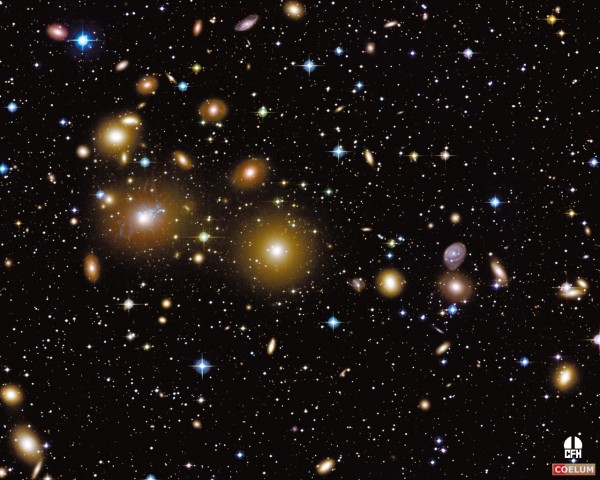 Image credit: Jean-Charles Cuillandre (CFHT) & Giovanni Anselmi (Coelum Astronomia), Hawaiian Starlight.
Image credit: Jean-Charles Cuillandre (CFHT) & Giovanni Anselmi (Coelum Astronomia), Hawaiian Starlight.
What seems absurd when applied to Earth is not only a legitimate consideration when it comes to the Universe, it's literally the ultimate question: what is the fate of the Universe?
In order to understand why this is a legitimate thing to consider, you have to go all the way back to the question of where we came from in order to get here.
That would be from the Big Bang, of course, which tells us that what we know as our Universe -- complete with all the matter and radiation in it -- started out from a hot, dense, expanding phase, and has been cooling, becoming less dense, and the expansion rate has been slowing down ever since.
I want you to pause for a moment, and recognize how remarkable this truly is.
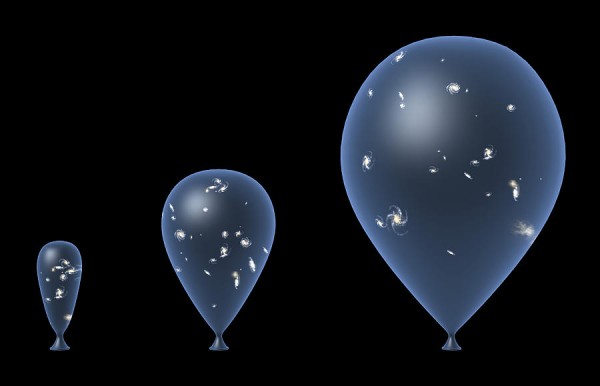 Image credit: Science Photo Library / Take 27 Ltd, via http://fineartamerica.com/.
Image credit: Science Photo Library / Take 27 Ltd, via http://fineartamerica.com/.
When you hear, "the Universe is expanding," you might get a certain picture in your head. Maybe it's of galaxies attached to the surface of a balloon that's being blown up; maybe it's of raisins being baked inside a loaf of bread; maybe it's a soap bubble with air pumped into it, or maybe something different entirely.
I'm well aware that none of these are completely satisfactory, because they're simply analogies for the mathematical framework of general relativity. Without going into the math, there are two things that determine how the Universe expands:
- All the different forms of energy density (including normal matter, dark matter, dark energy, neutrinos, photons, cosmic strings, domain walls, magnetic monopoles, and anything else you can dream up) present in the Universe at any given time, and
- What the actual, physical expansion rate happens to be at that particular time.
When I say "how the Universe expands," I mean, "how the expansion properties of the Universe evolve over time."
 Image credit: Ross Church of Jesus College, via http://jcsu.jesus.cam.ac.uk/.
Image credit: Ross Church of Jesus College, via http://jcsu.jesus.cam.ac.uk/.
There are, naively, three simple possibilities. And by simple, I mean Goldilocks-and-the-three-bears simple. Let me explain: as the Universe continues to expand, the total number of particles in it remains the same, but the volume continues to increase, meaning that the energy density drops, and since the expansion rate depends on the energy density, it drops, too. So based on that, here are the three (naive) possibilities.
- This Universe expands too slow. If the expansion rate at any time is below a certain critical value (determined by the energy density), it will drop to zero in a finite amount of time. Since gravity still exists, we'd then enter a phase of contraction (instead of expansion), and the Universe recollapses on itself in a Big Crunch. This would be the "fire" scenario, as the leftover radiation from the Big Bang would heat back up and fry everything in existence at the end.
- This Universe expands too fast. If the expansion rate is above that critical value determined by the energy density, there simply isn't enough "stuff" in the Universe to prevent the expansion from going on forever. Although the expansion rate will continue to drop, it will never reach that value of zero, and we instead would find ourselves living in an "open Universe" in the graph above. This scenario is known as the heat death of the Universe, or the "ice" scenario.
- This Universe expands just right. If the expansion rate is exactly at the critical value determined by the energy density, the expansion rate asymptotes to zero, but never quite reaches it. If there were just one more or one fewer particle in the Universe, you'd get either the first or second scenario above instead, but this would result in the slowest possible heat death imaginable.
To demonstrate just how sensitive these scenarios are to initial conditions, here's how "different" the expansion rate would have had to have been in the Early Universe to give a very different Universe today.
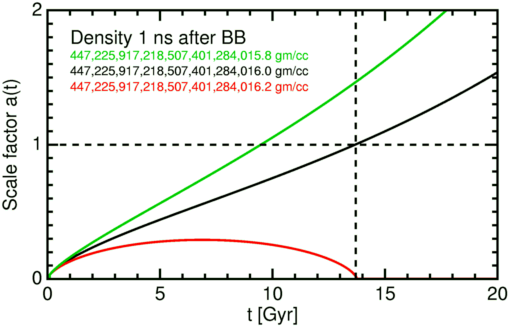 Image credit: Ned Wright's Cosmology Tutorial, via http://www.astro.ucla.edu/~wright/cosmolog.htm.
Image credit: Ned Wright's Cosmology Tutorial, via http://www.astro.ucla.edu/~wright/cosmolog.htm.
Just a difference of less than one part in 1024 meant the difference between our Universe as we know it today, a Universe nearly twice the size it is today, and a Universe that's already recollapsed!
And yet, thanks to the existence of dark energy, none of these scenarios is quite right!
Instead of the expansion rate tending towards zero, it tends towards a small but finite value! This is a very, very big deal, because it accelerates the arrival of our icy fate!
You might not be able to tell from the graph above, but the distance between galaxies starts to increase exponentially, which means that any single galaxy that isn't gravitationally bound to us now -- including all the large galaxy clusters in the Universe and pretty much everything beyond our little local group of galaxies -- is going to accelerate away from us over time.
Instead of distant objects continuing to move away from us but at an ever-slower rate, they move away faster and faster as time goes on, which is why we call it an accelerating Universe! Note that this is the case even though the expansion rate itself isn't increasing; it's simply not continuing to decrease, which is what all the old "decelerating" assumptions were based on!
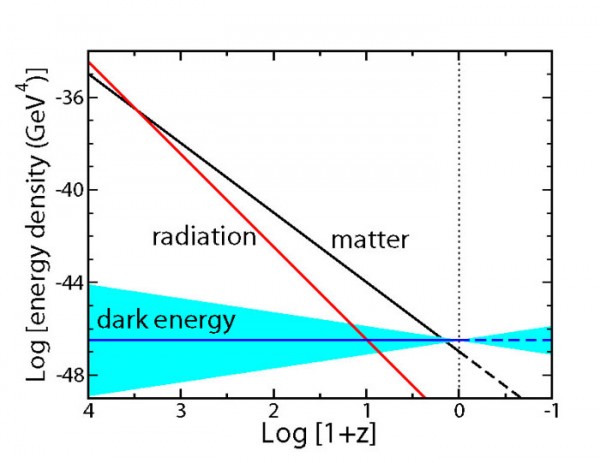 Image credit: Quantum Stories, retrieved via http://cuentos-cuanticos.com/.
Image credit: Quantum Stories, retrieved via http://cuentos-cuanticos.com/.
And it's all because of what dark energy is: an energy intrinsic to space itself! Unlike matter and radiation that dilute as the Universe expands, dark energy is equivalent to a cosmological constant because the energy density remains constant, even as the Universe continues to expand!
So the Universe isn't just going to end in ice; it's going to end in ice in the fastest way possible! Every galaxy in the image above will disappear from our Universe, and a great many of them are already unable to be reached by us, even if we could somehow travel at the speed of light! And still, that's a really, really long way away, and there are a huge number of interesting things that are going to happen for a long time to come.
With the entire local group bound to us -- more than a trillion stars' worth and even more in planets, gas and dark matter -- we've got a spectacular future to look forward to. But in short order, the local group is all there will be.
And as far as ending in ice? Its destruction is also great, and will suffice.
- Log in to post comments

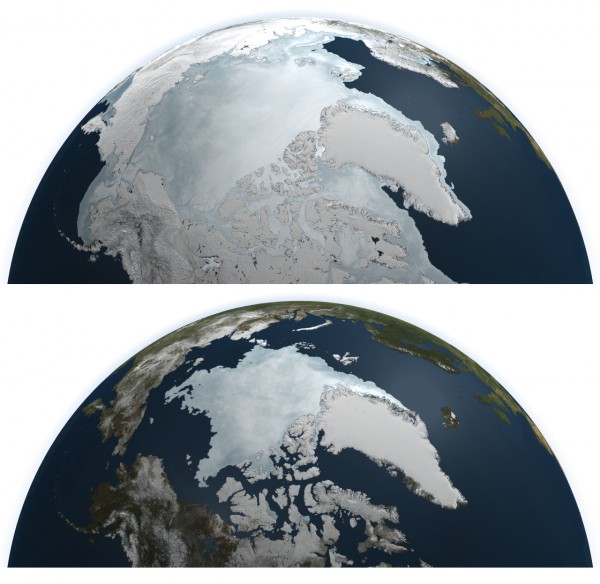
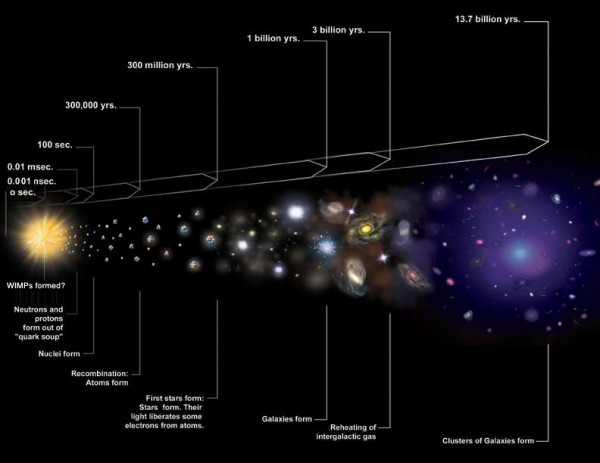
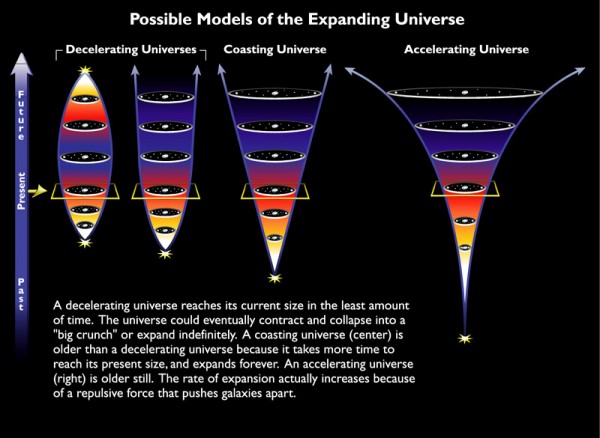
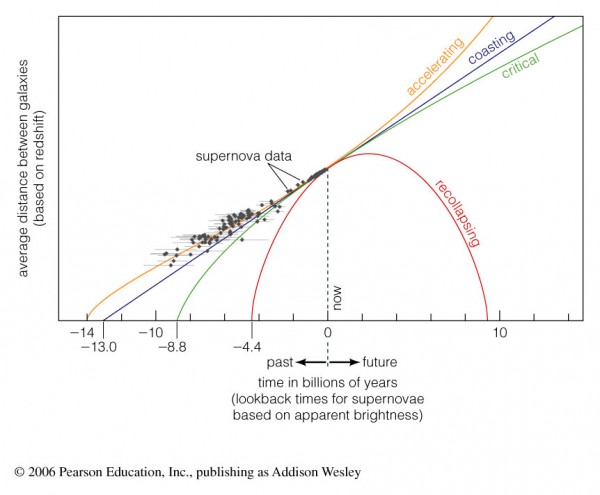

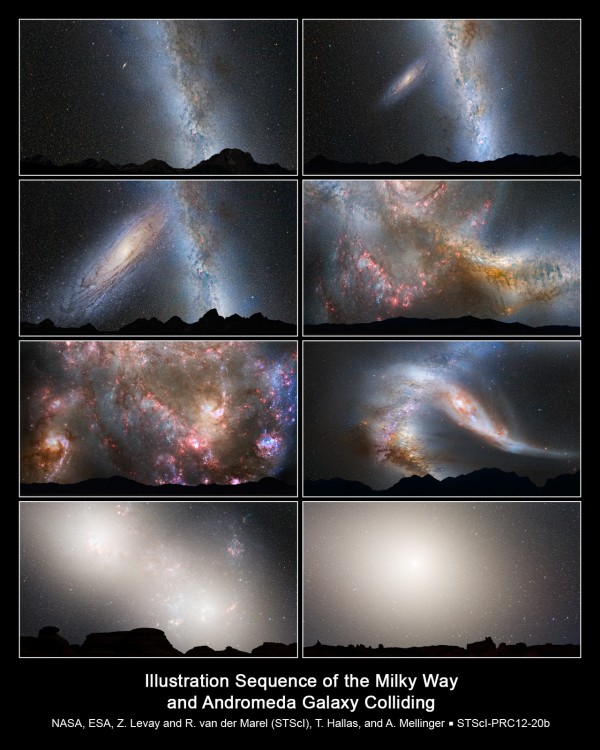
It seems to me that the force of dark energy is still weaker than gravity, if it serves to push galaxies apart and yet doesn't seem to have a "local effect" in keeping Andromeda and Milky Way from joining up in the future. Or, am I seeing this in the wrong light?
@Michael R Haubrich #1: From the papers and reviews I've read, you're correct that currently the cosmological expansion is weaker than gravity. The point of "dark energy" (or whatever is driving the acceleration of the expansion) is that the expansion rate may increase _without bound_. At some time in the future, the rate will be, even on "local" (galaxy cluster) scales, faster than gravitational infall. This feature of our current understanding is sometimes called the Big Rip.
Nice post! The tenth image from the top is a graph with horizontal axis labelled Log [1+z] & I suppose z = redshift. So I'm thinking...
0 = measurements of nearby [or the present]
4 = near the 'edge' of the observable universe [or back near the Big Bang]
QUESTIONS:-
1] -1 = the future?
2] The horizontal dark blue line is Dark Energy Density remaining constant, but what does the pale blue triangular region represent inside the lines that cross at z = 0?
Cheers
@Michael Fisher #3: The plot is logarithmic. The value of "4" means 1+z = 10,000, or before the CMB (at z ~ 1,100). log(1+z) = 0 is now (i.e., z=0), and log(1+z) = -1 is the future, as you say.
The triangular region represents the "error bars" or uncertainty on the value of dark energy, when projected back (or forward) in time.
@#4
Thanks for that Michael [& answer to question in the previous post]
Supplementary Question for you:-
The error bar for the Dark Energy Density at z = 0 [the present] is zero. I assume the value for the density is the cosmological constant [I'm not clear on that actually] ... & if so, do we have the cosmological constant value pinned down that accurately to have no error bar visible in that graph?
@ Michael Fisher
There are no error bars on DE because we can't measure it. We can measure redshift only. And redshift's due to DE are only becoming visible from z=0.5 or so..
@Ethan
Is there a reason why you're not equating DE with post Inflation field?
I always seem to come away with more questions than answers. This time it is: Is Dark Energy subject to E=mc^2? Or is Dark Energy just deceptively named and isn't really energy at all?
They way that question relates to this particular article is in the setup to the Goldilocks scenario setup where it is stated " the total number of particles in [the universe] remains the same". Then later it is said "dark energy is: an energy intrinsic to space itself".
Space is always being added, which means DE is always being added. E=mc^2 says mass and energy can be exchanged. If DE is subject to E=mc^2, wouldn't that mean the first statement wasn't true and that new mass/energy is always pouring into the system along with the space?
@Michael Fisher #5 (and Sinisa #6): On a log-log scale, our current uncertainty on the present value of Lambda is too small to see, but it is definitely not zero :-)
From some of Ethan's many other posts, I'm sure you can find plots of Lambda vs. Omega(b) vs. Omega(dm), the constraints on Omega-total being unity (i.e., a flat Universe), and so on. All those values have uncertainties associated with them.
@Denier #7: "Dark Energy" is just a stupid label some astrophysicists came up with because it was euphonious when paired with dark matter. In my description below, I will use the usual technical terminology of the field, which you should use as keywords to do a Wikipedia or Google Scholar search.
In the simplest version, "dark energy" is just a numerical constant (Λ) which is added to one side of the Einstein equation. This is the "cosmological constant." As such, it's comes into every one of the sixteen components of the stress-energy tensor (which describes mass-energy in GR), but has a weird effect compared to normal matter: it has what is called "negative pressure", pushing outward rather than pressing inward. This is why it would drive an accelerated expansion.
There are other, more complex models for what "dark energy" could be. These are generally inspired from particle physics concepts, and involve a scalar field (like, but not the same as, either the Higgs field or the "inflaton"), which also produce a peculiar form of energy with associated negative pressure.
@Michael R Haubrich: Depends on the scale you're looking at.
Dark Energy appears to be very weak locally, but constant throughout space so that over large distances it adds up.
So on the scale of galaxies and galaxy clusters, the minute expansion of space from DE is instantly and trivially overridden by gravitational attraction.
On cosmic scales the gravitational attraction between galaxies is very small, but the rate at which space is expanding between them is large, so it's the attraction that is trivial and the expansion which dominates.
If there is energy in empty space where is this energy coming from, considering that more space is being "created" by expansion.
Is this.energy attached to space negative? Because it acts against gravity (caused by matter and positive energy)...
@ #10 peter foelsche
Re energy conservation, this by Sean Carroll is worth a read:- http://blogs.discovermagazine.com/cosmicvariance/2010/02/22/energy-is-n…
"...in my experience, saying “there’s energy in the gravitational field, but it’s negative, so it exactly cancels the energy you think is being gained in the matter fields” does not actually increase anyone’s understanding — it just quiets them down. Whereas if you say “in general relativity spacetime can give energy to matter, or absorb it from matter, so that the total energy simply isn’t conserved,” they might be surprised but I think most people do actually gain some understanding thereby. Energy isn’t conserved; it changes because spacetime does..."
I will not quibble with any scientific detail of this post.
However, the overarching premise of this post is that it is a settled scientific matter that the universe has a beginning and an end.
"the list of unsolved physics problems.. cosmic inflation, horizon problem, future of the universe, gravitational wave, baryon asymmetry, cosmological constant, dark matter, dark energy, ecliptic alignment of CMB anisotropy, shape of the universe..." etc. is long and quite relevant to discussions of beginnings and/or ends of the universe http://en.wikipedia.org/wiki/List_of_unsolved_problems_in_physics
In my mind, statements like "So the Universe isn’t just going to end in ice; it’s going to end in ice in the fastest way possible! " give unmerited and dramatic philosophic certainty to an otherwise scientific discussion.
An example of a less dramatic perspective on the beginning is from Is Eternal Inflation Past-Eternal? And What if It Is? by Leonard Susskind. 2012 http://arxiv.org/pdf/1205.0589v1.pdf
"in any kind of inflating cosmology the odds strongly (infinitely) favor the beginning to be so far in the past that it is effectively at minus infinity.. Let me now review the counterargument for a beginning and discuss its validity." Well that's more like the open mind that I think is scientifically appropriate in light of so many unsolved physics problems which are crucial for a proper scientific interpretation of beginnings and/or ends.
That is, of course, assuming we wish to carry on our discussion of beginnings and/or ends of our universe in the domain of science, not philosophy, theology, or dogma.
Ha, I was just about to link that post Michael Fisher. Sean is an excellent source.
But yes. In GR it's the energy density of empty space that is a constant, and if that constant is non-zero, then that means spacetime will evolve in such a way that it expands and because the energy density is constant, total energy will increase.
It's worth noting, for peace of mind -- or at least I found it soothing when I first learned this -- that when spacetime is static or asymptotically flat, which describes our solar system and galaxy very well, energy is conserved.
Also, the way energy changes over time is well-defined, so it's not like this means all bets are off and anything can happen. That perpetual motion machine is still impossible.
OKThen:
Ethan is obviously assuming inflationary cosmology as he always does, which means the "beginning" of the universe as we know it was the Big Bang but before that was an inflationary period of unknown and possibly infinite extent. That there was a Big Bang has as much scientific evidence behind is as just about anything.
Whether or not there would be an end, and what it would be, was an open question awaiting observational evidence. What evidence we have acquired, while not as overwhelming as that for the "beginning", is compelling.
Ethan is simply discussing that evidence and what knowledge we have and what it points to. You talk about how we should be discussing in the realm of science, not philosophy, but you're making a purely philosophical, explicitly non-scientific, argument about how many disclaimers he should have appended.
Or to put it another way: If Ethan ended his post with "to the best of our current knowledge, which could be wrong", what precisely would your objection be then?
CB #14
If you read my comment #12, then you would realize that Leonard Susskind's quote was about "any kind of inflating cosmology".
I am not disputing that the current big bang theory is the current best pragmatic theory for many astronomical observationbs. Though of course, many astronomical observations do fall into the domain of unsolved physics problems.
Rather, I am suggesting that scientific domain of relevance of the current big bang theory is where it is a necessary pragmatic for theoretical physics explanation of the observed universe.
Whereas, when the big bang theory is extrapolated beyond the humanly observable (because it is a literally true theory); then we have left the scientific discussion (of a useful and necessary theory in our current understanding of astrophysics at the largest observable scales); and we have entered the domains of philosophy, theology, or dogma.
OKThen: Any kind of inflating cosmology is an extension of Big Bang cosmology.
And if you read my post, you'd have seen my point was that Ethan is implicitly agreeing with Susskind (and explicitly when he actually discusses inflation) that inflation could very well be infinite in extent. The "beginning" you disparage him for claiming is not the true beginning-of-everything, it's simply the beginning of the universe-as-we-know-it. It's the point that any inflationary cosmology agrees occurred.
Because there's far more human-observed evidence for the Big Bang than there is for inflation, much less any specific inflationary model. We don't know which inflationary model is the right one, though data from Planck et. al. have allowed some differentiation.
So if your concern is about extrapolating beyond human-observables, then Ethan's decision to start with the Big Bang while ignoring for this post ignoring the unknown prior should please you, while Susskind's remarks about eternal-past inflation should fall much more into the bucket of "philosophy, theology, or dogma".
Unless it's simply his use of the term "the odds strongly (infinitely) favor" instead of "is" that gets him a pass. In which case I would first point out the important parenthetical in that quote, and that "the odds infinitely favor" is actually, mathematically, the same as "is".
But pretending that wasn't the case and he simply said "likely", then I ask again: Assume Ethan made a similar disclaimer at the end of his post. What then would your objection be?
I personally think Ethan writing posts about what our best Lambda-CDM cosmology says without belabouring endless disclaimers of "might" and "we think" is perfectly fine. "To the best of our knowledge, which could be wrong" is, I would think, understood for anyone without a philosophical axe to grind.
CB
In #12, I stated my significant objection to Ethan's post.
I will not further discuss Susskind's words; you have obviously misunderstood my point.
Let me repeat:
In my mind, statements like “So the Universe isn’t just going to end in ice; it’s going to end in ice in the fastest way possible! ” give unmerited and dramatic philosophic certainty to an otherwise scientific discussion.
Wikipedia describes at least seven possible ultimate fates of the universe. All of which accept the big bang and cosmic inflation. One of these fates is Ethan's.
About these seven, Wikipedia says "Each possibility described so far is based on a very simple form for the dark energy equation of state. But as the name is meant to imply, very little is actually currently known about the real physics of the dark energy.. As dark energy and dark matter themselves are also totally hypothetical and have not been conclusively proven, the possibilities surrounding them are currently unknown."
Elsewhere http://arxiv.org/pdf/1002.1952v2.pdf 2010, Lawrence M. Krauss writes about the fate of the universe, "We appear to live in a very special time: the only time when we can observationally verify that we live at a very special time! Of course, however, it is likely that all observers at all times may feel this is the case. What considerations of the future tell is that we perhaps should have some cosmic humility. Perhaps observations made in the far future will reveal aspects of the universe we cannot yet measure that will change the current, strange model we have uncovered for the cosmos, or that will reveal aspects of dark energy that we cannot now even imagine."
So is the statement:
"So the Universe isn’t just going to end in ice; it’s going to end in ice in the fastest way possible!"
an example of:
A) cosmic dogma, or
B) cosmic humility?
I don't have a "philosophic axe to grind"; I have a scientific axe to grind when Ethan's tabloid journalistically misrepresents scientific uncertainty as scientific certainty.
Just a difference of less than one part in 10**24 meant the difference between our Universe as we know it today, a Universe nearly twice the size it is today, and a Universe that’s already recollapsed!" was perhaps one of the more important reminders. This is just one of several "fine tuning" knife-edge physical constants of our universe that we are amazed by, and might not be here to be amazed if it were not true.
The widely accepted evidence that the universe had a beginning in time, like all science, can certainly be supplemented by caveats. But science is always subject to discovery of more facts. We all know that Newtonian physics was supplemented by the theory of special/general relativity, which was then supplemented by quantum mechanics, which lately has been supplemented by proposals for string theory or an "imaginary" solution to the space-time issue (perhaps more based on philosophy than on observation). And philosophy is always subject to more "speculation." And religion is always (or should be) subject to more "revelation" or "discussion." Dogma or humility? Good question.
Even the definition of "science" is not universally agreed upon. Some define it as observations leading to the "most likely explanation." Others, again based perhaps more on philosophy, want some restrictions to narrow that definition.
I have no problem with Ethan giving what he regards as the most likely explanation. And no problem with others supplementing the discussion with caveats or possible alternatives. That is what science is all about.
"And religion is always (or should be) subject to more “revelation” or “discussion."
No, the bible is held up as inerrant and unchanging and for that reason alone is proof that it's the Word Of God.
"Should be"? Yes.
"Is"? No.
OKThen: You present a false dichotomy. It's neither humility nor dogma. It's simply a description of what our current observations plus our best model of the universe say about the fate of the universe. Minus all the disclaimers and qualifiers you personally believe are necessary. That doesn't make it dogma. The belief that anything which does not meet your personal opinion on the amount of disclaimers needed is necessarily a dogmatic belief, is itself dogma. As in a belief that does not have and is not subject to evaluation by evidence.
Show me the evidence that the lack of disclaimers means Ethan is unwilling to revisit his statements should observations show otherwise, and then you'll have a case that it is dogma. If you don't have any such evidence, then that means this is your dogma.
Or is it not your dogma, and despite the lack of "I could be wrong" disclaimers in your post, you do accept that you could in fact be wrong and are not completely certain of your assessment?
Well then!
In the context of Lambda-CDM cosmology, which by assuming GR and a non-zero vacuum energy density explains observations extremely well (see Planck data for one powerful example), the fate of the universe will be as Ethan describes. Can you argue against this?
No, you can't.
If Ethan had explicitly stated that context, and added the "according to this (highly successful) model, which could be wrong about these relatively new observations" disclaimer, what then would you say?
Then if you accept that this disclaimer is implied, what then would you say?
Nothing but that this disclaimer should be explicit, apparently.
Which, because it involves only how science should be covered on a blog, means it is a purely philosophical opinion.
Seems the discussion above proves the point that religion is always subject to more "discussion." And MOST of those who hold the Bible in high esteem believe that God through "revelation" helps us interpret the scripture. So let's not have a war of words.
Getting back to the significance of Ethan's post, it seems that several scientists are interested in the nature of science, and the relationship between science/philosophy/religion. Of course, it's possible that a scientist is simply a collection of billions of molecules, organized through DNA and epigenetic information which then responds to observational stimuli. In that case, perhaps scientists should avoid the contributions of philosophy and religion, and just concentrate on responding to the stimuli.
Uh, either you're using a self-fulfilling prophesy for "discussion", you're confused about the difference between Religion and Cosmological science, or you're inhabiting a different forum here from anyone else.
OkThen:
Why? If I say "my shirt is blue. And it's not only blue, its really blue!," do you read unmerited and dramatic philosophic certainty into this otherwise scientific statement?
It seems to me that any unmerited and dramatic philosophical certainty is coming out of your own biases as a listener. To wit: when you agree with a claim or find it unexceptional, you interpret a lack of caveats to mean nothing special in terms of philosophical certainty. In such cases, the lack of caveats is not objectionable to you and their lack is not interpreted by you to mean the person is claiming some deep philosophical certainty. But when you disagree with a claim or find it surprising/unusual, you instead interpret a lack of caveats as meaning the speaker is claiming a deep philosophical certainty.
I have a suggestion for you OKThen: in the future, interpret any claim by any scientist as being a "normal science claim," with all of the standard scientific caveats implied. Only interpret some scientists' claim about the universe as a statement of deep philosophical certainty if they tell you that's the type of certainty they're claiming. Assume all statements are no greater than a 6.5 on the Dawkins 7-point scale unless the speaker explicitly claims a 7.
Its very tiresome to be having a regular conversation, filled with numerous factual statements and knowledge statements ("I know...") by all speakers, and have some philosophically-minded critic derail it by claiming that uncaveated conversatonal statement #453, unlike statements #1-452 or $454-1,000, requires the caveats be stated explicitly because without them it's a claim of such deep philosophical certainty that no inductive process could reasonably support that claim.
To spin this to the positive, OKThen, consider this plan for the future:
As eric says, consider every science claim auto-caveated by being a scientific, as opposed to dogmatic, claim.
Then go hoof around for the caveats of the discussion, learning the issues and limitations, the improvements of the statement and the strength of the validity.
This need only be done with those claims you wish to see the "rough underbelly" of.
Then discuss the findings you have, how they have been improved on as far as you've been able to determine and open it up for further information by querying on the discoveries you've made.
a) you've learnt a lot
b) you've shown what you've learned
c) others will have leant from your efforts
d) if there is further detail, or alternative, or just newer things, then the discussion of those are open to further commentators without burying the original content under excessive thicket-language.
And even that discussion need not be made. You can consider finding the caveats as value enough, the original discussion was seed for the new discovery you've made and, really, that needs to be all it is, if you do not feel it warrants bruiting about for some reason.
Heck, if this occurs often enough, consider making a follower blog where you discuss whatever idea you got from SWAB that made you look for more. Consider the benefit to others seeing how you went about looking. A DIY on "How to investigate science", which is different from the reason for this blog, which is more educational.
Poorboy, you really should look up the term "emergent properties" sometime. It might well help you to understand that while a scientist is a collection of many billions of molecules organized through DNA and epigenetic information and responding to stimuli (BTW, the same description accurately applies to philosophers, teachers, plumbers, etc. as well), that scientist is at the same time much more than what you've described.
BTW, poorboy, your description applies equally well to chimpanzees, gorillas, dog, cats, trees, grass, fungi, amoebae, bacteria, ie. pretty much all living organisms. Obviously, naive reductionism such as you've attempted to apply is not the whole story.
@Sean T #25/26: But you know, naive reductionism is such a wonderful straw man to allow deists to try to out argue scientists. As near as I've been able to tell, it's really only the deists who think naive reductionism is a real approach to understanding the world. Scientists know better.
Humorously, we see some interesting responses to stimuIi, and I appreciate each and try to learn from them! But seriously, it seems we all agree that scientists are not unique in their behavior, and we all agree that conscious beings are more than a "collection of molecules." Just as a symphony (for one who appreciates great music) is more than the plastic CD on which molecules have been cleverly aligned.
The philosopher is interested in WHY, and many scientists are also interested in WHY. Some have concluded that the WHY ends along with the universe in its meaningless icy death. But they still struggle to have meaningful blog conversations.
There is always some sense in which the "whole is greater than the sum of its parts." Many of us get creative satisfaction from intelligently bringing parts together with information into a greater whole. I do suggest it is helpful to summarize concepts (e.g. "emergent properties"), even though they might seem obvious, rather than trying to clinch an argument with a directive to "look it up."
As a bottom line, life is more interesting and rewarding (as well as productive) if scientists, philosophers, deists, etc. have some appreciation for each other. A little humility is always better than a lot of dogma.
Ah, so my hypothesis is correct: you're a troller, poor boy.